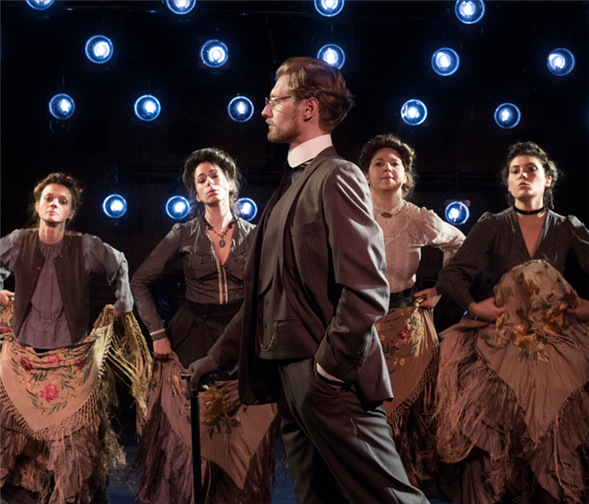Translate Page

Machines and humans collide in Evening – 1910
---
As technology becomes more prominent, do we humans lose our place in the world? That's a familiar question in our digital age, though it's hardly new. At the turn of the 20th century, the arrival of industrialization and automation provoked a deep anxiety about the new power of machines.
Our species has survived, of course, and the human spirit sings and flourishes even as screens flicker and glow. That tension wriggles inside Evening – 1910, a new musical currently being presented by Axis Company. The show follows Henry, an Irish immigrant who comes to New York City during the titular year. He finds himself surrounded by showgirls and theatre owners just as the movies are starting to push vaudeville productions out of the spotlight. What will happen to his passion as one art form gives way to another? What will happen to the performers who think there's a better life waiting for them at a garment factory?
TDF Stages asked the creators of Evening – 1910 to tell us how this musical is bringing those questions (and a vanished New York) to life.
{Image1}
---
Marc Palmieri (dramaturg):
One of the many resources we relied upon while developing this show is Luc Sante's history of New York City, LOWLIFE. One enormous impression the book leaves is that the ever-changing, ever-evolving, expanding-and-retracting nature of this city has been there from the start. We chose a story that considers the loss of the old as much as it does the gain of the new. In this case, that's the closing of a variety theatre on the Bowery, which is making way for a kinetoscope parlor. It's live form of human contact replaced by a technological one. It's over 100 years ago, but such a progress, even in its distant context, can feel astonishingly familiar to today's audience.
Randy Sharp (co-composer and co-lyricist, director):
I think that setting a play in a period before the present (or in some cases in the future) serves to re-awaken the audience's observational power. This show is set in an incredible and dynamic time. 1910 was four years away from the First World War. Electric light and telephones were still luxuries. News travelled slowly, although the transatlantic cable quietly transmitted telegrams beneath the Atlantic. The Dustbowl and the Depression were only a few years out. 35 years after this play the Hiroshima bomb was dropped. The play takes place at an intersection in time, when the modern age is about to smash into the past.
{Image2}
Paul Carbonara (co-composer and co-lyricist, musical arrangement)
A big part of my inspiration for the music for this show comes from the collision between humans and machines. Coincidentally, this is a large theme in this work. It was always challenging, when I played with Blondie, to get the people and the machines to cooperate: the drummer would get off of the sequencer; the sequencer would glitch and throw the rhythm into chaos. The band could get lost while the computers happily chugged along. All kinds of things would happen, sometimes to good effect.
There is something about that line between machines and humans that is really beautiful to me. The contrast between a perfect metronome and a living musician can be very poignant. Maybe it's a machine sounding more human and a human sounding more like a machine that gets me. It might be that this line is getting blurry these days. This is very exciting and a little scary, always a good combination.
I've tried to achieve this effect in many parts of the show. I'm working with three great players: Sam Quiggins on cello, Nick Stubblelfield on piano, and Frederika Krier on violin. I'll give them a simple direction – for example, "play this like you're a sewing machine" – and ask them to run with it. I want to create an effect or convey an emotion, but I also want there to be room for the band to improvise. We need to hit our cues of course, but playing the exact same parts every night would be so boring. We're not machines after all.
---
TDF Members: At press time, discount tickets were available to Evening – 1910. Go here to browse our current offers.
Follow Mark Blankenship at @IAmBlankenship. Follow TDF at @TDFNYC.
Photos by Pavel Antonov. Top photo (L to R): Lynn Mancinelli, Stephanie Lynne Mason, James Scheider, Shira Averbuch, Katie Rose Summerfield